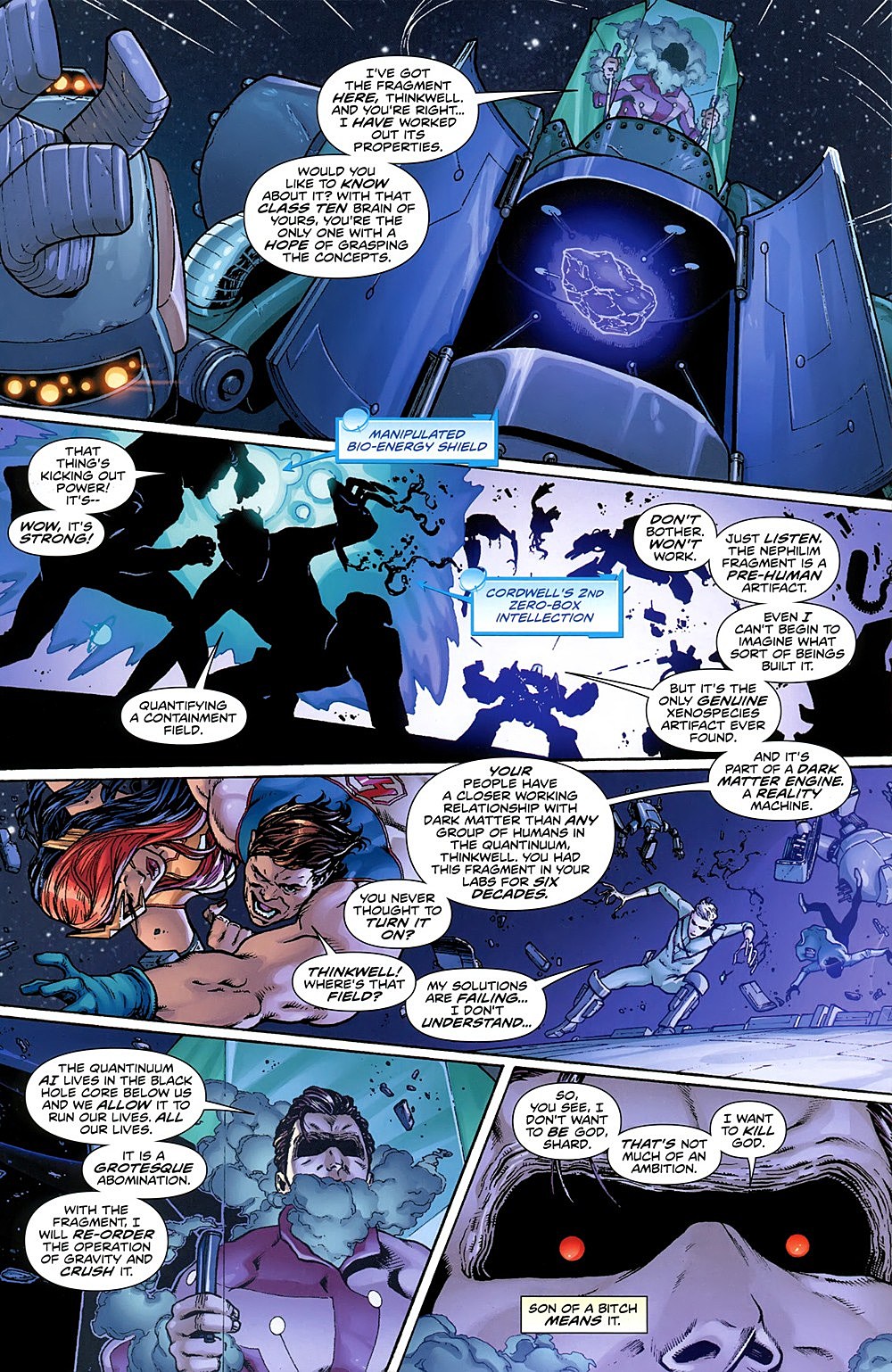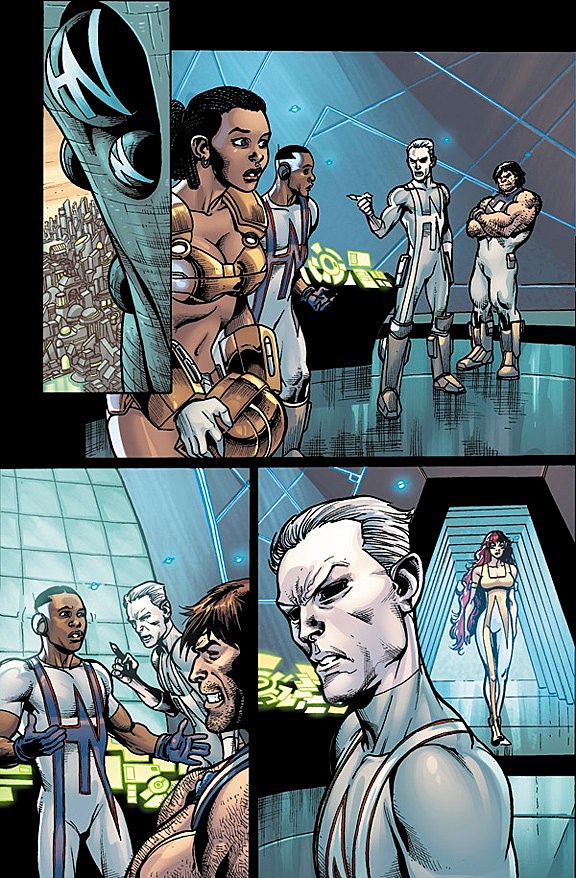![Human Galactic Culture: ‘Guardians Of The Galaxy’ Writers Abnett & Lanning On ‘The Hypernaturals’ [Interview]](http://townsquare.media/site/622/files/2012/10/the-hypernaturals001pg023.jpg?w=980&q=75)
Human Galactic Culture: ‘Guardians Of The Galaxy’ Writers Abnett & Lanning On ‘The Hypernaturals’ [Interview]
 British comics writers Dan Abnett and Andy Lanning have earned themselves a loyal following of superhero fans for their prodigious work on team books for Marvel and DC Comics, particularly those taking place in the more specifically "science fictiony" corners of those publishing lines. The partnership -- known collectively to their readers as DnA -- are probably best known for a run of titles from the last ten years that would define what's commonly called Marvel's "cosmic" line. Collaborating with a host of artists, DnA's Annihilation series, Nova, War of Kings and others reinvigorated Marvel's sci-fi stable, to the degree that their version of Guardians of the Galaxy is the direct inspiration for a forthcoming Marvel Studios film.
British comics writers Dan Abnett and Andy Lanning have earned themselves a loyal following of superhero fans for their prodigious work on team books for Marvel and DC Comics, particularly those taking place in the more specifically "science fictiony" corners of those publishing lines. The partnership -- known collectively to their readers as DnA -- are probably best known for a run of titles from the last ten years that would define what's commonly called Marvel's "cosmic" line. Collaborating with a host of artists, DnA's Annihilation series, Nova, War of Kings and others reinvigorated Marvel's sci-fi stable, to the degree that their version of Guardians of the Galaxy is the direct inspiration for a forthcoming Marvel Studios film.
Abnett and Lanning's latest work is The Hypernaturals, a science fiction epic co-created with former Guardians of the Galaxy artist Brad Walker that sees these creators' imaginations spill out onto the page in a way that's quite distinct from their popular Marvel/DC work. Charged with keeping the peace in a galaxy where virtually all of mankind's needs are taken care of by the Quantinnum A.I. (i.e. god machine), the Hypernaturals are a superhero team, to be sure, but they exist in a universe that is imagined from the ground up, in a philosophically curious story that drives its diverse cast towards irrevocable ends, and in an idiosyncratic publishing format that rewards readers who wish to immerse themselves in "human galactic culture."
Sales of The Hypernaturals #1 necessitated that publisher BOOM! Studios release three printings, and I've found that the story gets pretty addicting from there on. With four issues available so far, I asked Abnett and Lanning to talk a little about the work that's so clearly inspiring them, why they couldn't have created The Hypernaturals at Marvel or DC, the challenges of launching original ongoings in today's market, and about the Guardians of the Galaxy film based on their work.

Helpfully, every issue of The Hypernaturals begins with a recap page that gives readers a very quick but effective introduction to the Nanocene Era, a 100-year period of future history that begins with the creation of The Quantinuum, an artificial intelligence that achieves singularity and administers all of the day-to-day functions of society. In the Quantinuum (which is also the name for human galactic culture in general) transportation, food and shelter are all taken care of by the A.I. What that leaves humanity free to do is one of the things I asked DnA below, but some of those humans become Hypernaturals, celebrated superpowered beings who protect the Quantinuum for five-year terms. At the start of the series, the newest lineup vanishes on its very first mission, causing a group of retired heroes and runners-up to step into action without any warning. In a bit of a sci-fi twist on the Hannibal Lecter story, some of the ad hoc Hypernaturals are forced to consult with Sublime, a brilliant but violent anarchist whose greatest wish is to destroy the Quantinuum A.I. that maintains civilization itself.
The Hypernaturals narrative follows a large cast and deals mainly with their relationships with each other and to the immediate events surrounding them, but DnA found ways to give curious readers like me several devices with which to learn more about the universe they obviously imagined in great detail. Recap pages are designed to be in-story communiques transmitted over the fictional Q-Data link, and they're followed by faux advertisements (think "got milk?" ads with celebrities) that offer insight into various cast members. From there, each issue begins in earnest with a flashback sequence that reveals more details about pertinent missions undertaken by Hypernaturals iterations of the past. Issues conclude with pages that seemed ripped out of fictional lifestyle magazines, featuring portions of interviews with different Hypernaturals that reveal more details about the world the series creators imagined.
This quirky but formalized structure is immensely useful to new readers, but is something you'd hardly ever see attempted in a Marvel or DC comic, where publishing formats and editorial necessities usually put the focus on the single-issue periodical, rather than on the larger, more complete work like what DnA have envisioned (12 issues to start). That's just one of the things I talked to writers Abnett and Lanning about after plowing through the first four issues of The Hypernaturals.

ComicsAlliance: The very first thing I wanted to ask you guys about is the Quantinuum, the A.I. that's said to control human galactic culture. The book itself spends most of its time on the characters and story, so I want to know from you some of the background details. In a literal sense, what exactly is it doing to manage society? What human choices or actions have been taken out of the equation by its existence, and what can the humanity of the nanocene era do with their time that you and I cannot?
DnA: Pretty much anything they like! The Quantinuum computer is an A.I. that has achieved singularity and makes everything -- just about everything -- technically possible. It runs the universe like a benevolent god, looking after all aspects of human life (good examples would be the Q-Trip travel system, or universal Q-Data news), and basically providing for our needs. It has the "brain power" to handle the vast vast vast amounts of data needed to run a society so huge and star-spanning. Within this utopian ideal however, humans are still having to deal with the usual daily problems that have beset mankind from our very earliest times: relationships, greed, violence, anger, and jealousy. The social and technological environment maybe light years ahead of where we are today, in the same way that today's society is vastly different to what it was 250 years ago, but the human condition has not progressed all that much. We like to think we're more civilized and sophisticated, but scratch the surface and people will still act and react to each other pretty much the same as they always have. It's a source of great conflict and drama to see characters in a supposedly near perfect, super sci-fi environment arguing over who's turn it is to put the trash bins out. Add into that the fact they have awesome super powers and it makes for some really fun stuff!
CA: I'm also curious about your thinking on the Quantinuum in a more philosophical and dramatic sense. It's a great science fiction notion, this god machine that takes care of everything, but I think we're trained from all these stories like The Matrix and Terminator and so forth that living machines is a pretty bad idea because, you know, apocalypse. But in Hypernaturals it seems to be en explicitly passive thing, no?
DnA: Oh yes. This is is a positive vision of a post-singularity future human evolution and possibility have taken a big leap forward. The notion of the evil god machine is a fun one to play with. However we're more focused on the notion that, as a society, we've become so familiar to the technology that surrounds every aspect of our lives without ever really understanding the impact it's having on us and without even knowing, beyond the basics, how it all works. Wireless networks, information clouds, augmented reality, holographic and 3D imaging are all pretty much in daily use, yet to regular users of this advanced technology it might as well be magic. We wanted to extrapolate this idea to a future society where the technology is as different to now as mobile phones are to smoke signals; and set a story in this Post-Singularity world that plays with these ideas and uses them as the basis for dramatic stories. In other words, the tale we're telling would be pretty dull if things didn't take a turn for the worse at some point, but hopefully, not in the way you'd expect from this type of story.
CA: There is one guy in the series who is very firmly against the Quantinuum, and that's Sublime. He says, "I'm going to kill God." He's a tricky character for me to nail down, which of course I realize is part of the story, but I find myself asking, does he want to kill the Quantinuum A.I. to save humanity because he's a misunderstood hero, or is he just a villainous dick, as evidenced by his attack on Stellerator, the married-with-kids hero who he regressed to a child?
DnA: He's hyper-smart, and he's an anarchist. He hates the idea of anyone or anything telling him -- or the species as a whole -- what to do. He doesn't believe in the system or any system, and wants to bring it down. Sometimes that will make him a real dick on an individual level (i.e. to Stellerator) and sometimes in a much broader, philosophical way. He's also a bit of a psycho! We'll be revealing more of his backstory in upcoming issues and will see that he has very personal motivations for hating the Quantinuum -- reasons that have left him unhinged and vengeful.
CA: Will Sublime's story be wrapped up in the first arc of the story or is he a kind of Lex Luthor for the Hypernaturals, whose story just goes on and on as long as the series does?
DnA: There will be some closure, but we're not going to spoil the ending here. Needless to say that every super team or hero has their arch villain. Part of the fun of creating the Hypernaturals Universe has been fleshing out great characters for them to interact with, including their rogue's gallery. This is a seriously powerful team and we need to give them some equally serious foes to battle but not only that, we want their adversaries to have cool backstory's and personalities to go along with their awesome powers. When you get this combination right, you end up with compelling characters that you'll want to see returning at some point, story permitting!
CA: Along those lines, I'd like to know how you plan a series with as much world-building as Hypernaturals in today's market, which is challenging for all periodicals but original comics in particular. Do you know how many issues you need to complete the story, or at least the first story, in case support for Hypernaturals drops off? Do you think early on about how the comics will be collected in books?
DnA: Yes, we did, and we've planned out the stages as carefully as possible. Having said that, we believe that creators should be bold, and put big ideas out there, and not flinch from expecting the audience to be smart and eager to learn more. We've planned the first story arc to span the first 12 issues (13 if you include the pre-credits sequence in the Free Comic Book Day issue), with break points along the way for collected editions. We wanted this opening arc to be a complete tale in itself, but one that also serves to establish the characters and the world of the Hypernaturals so that, hopefully, readers will want to see more of these characters and the world they occupy in future stories. Our template was very much guided by classic "maxi-series" like Watchmen and Give Me Liberty, where the story makes the most of the multi-issue length and fully explores the novel telling element of the graphic novel. Both of these books were also excellent examples of world-building too, offering extra material within the story as well as supplementary text pieces that augmented and expanded the world of the tale they were telling. If we can attain a fraction of their achievement in doing this, then we will be very happy.
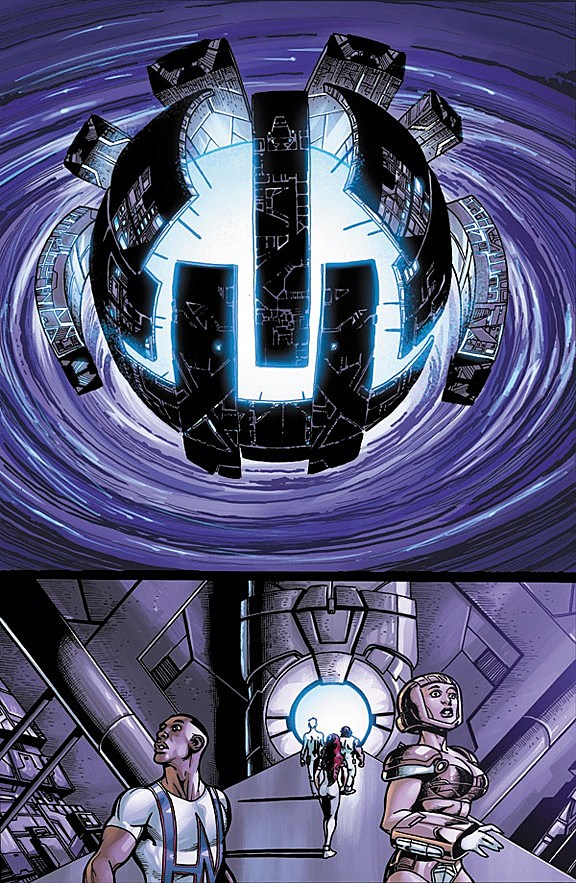
CA: As I said, Hypernaturals focuses very squarely on the characters and their stories while much of the world-building stuff is kind of in the background or in the helpful supplemental material included in every issue. There are a lot of characters: you've got Thinkwell and Bewilder and their two rookies, you've got the fallen-on-hard-times hero Clone 45 and the rest of the former Hypernaturals, and you've got them team who went missing before the book begins. Will people come and go as their arcs get resolved, or is this the core group?
DnA: The veterans and replacements will essentially be the core group, but this is a series in which all bets are off. Anything can happen.... to anyone! Besides, big cast cosmic books are HUGE FUN! As we've said, part of that fun is creating a large cast of fully realized characters, each one with a wealth of background detail and rich histories. This makes telling other stories about them really attractive and gives us more than enough material to play with. And that's without all the new stuff we find ourselves having to cook up with each new issue.
CA: You guys are most famous for science fiction books with big casts like Guardians of the Galaxy, as well as Legion of Super-Heroes, Warhammer 40,000, the 2000 AD stuff; the impressive list goes on. As writers (and readers), what do you personally enjoy about working on ensemble books of this type? What keeps bringing you back to the cosmic team book?
DnA: We both like the way superheroes work in a sci-fi/cosmic environment. It kind of makes them make more sense. Costumes become uniforms or work clothes and, the scale gets bigger and more outlandish. It very much appeals to us. Maybe it's a very British thing! Ensemble books also give you a chance to tell stories from multi-character viewpoints. That means you can always mix things up issue by issue by switching characters and exploring things from their viewpoint. With a large cast you always have fresh perspectives to play with; and that keeps things really interesting and keeps us coming up with different ideas depending o who we're focusing on at any given point in the story, which is creatively very rewarding.
CA: The most obvious distinction between Hypernaturals and your Marvel and DC work is simply that it isn't Marvel and DC work. You're creating a whole new world here and I'm curious to know how different your approach to the material may be, and what challenges and advantages there are to creating this kind of book outside of your usual circumstances? Are there things you've wanted to do in your Marvel/DC cosmic books that you're only getting to do for the first time in Hypernaturals? I ask that with respect to characters and story but also with respect to format. One thing I noticed right away was the formal flashback sequence structure, and the "magazine" style getting-to-know-you features, which are hard to imagine in a currentMarvel or DC book.
DnA: Yeah, all of that is the case. We can do things with format and structure. But the main thing is the universe itself. This is a story that simply couldn't work in the Marvel Universe or the DC Universe. This isn't a Legion or Guardians story that we've shifted sideways and repurposed.. When you're dealing with a character that has X-number of years of continuity and may well be appearing in several other titles as well, it places necessary constraint on what you can do with them and with the continuity they exists in. With Hypernaturals, there are no constraints on us: we've created these guys, we can just as easily destroy them. It gives the stories a genuine sense of tension and drama, because anyone of our characters may not make it to the end of an issue. World (or universe) building is paying dividends for us here creatively. We are creating new elements with every issue and this is where the formatting really helps as we are able to add extra detail and background to concepts and characters through the articles and adverts we use in each issue. It's great fun but, as we've been finding out, is also a lot of extra work that when working in a predefined comic company's continuity you don't have to do because you have decades of issues to draw on.
CA: We'd be remiss if we didn't ask you guys about Marvel Studios' Guardians of the Galaxy film, which is obviously inspired by the comics you wrote in the recent past. What was your reaction to that news? Were you aware that such a project was in development and are you at all involved with it in any way?
DnA: They'd hinted. We're obviously very pleased that something we did is considered such a good idea that it's worth a movie. We don't know much beyond that.
CA: Obviously ComicsAlliance has covered the subject of creator credit and compensation when it comes to motion picture adaptations. Is there anything you care to report on that front, with respect to this film?
DnA: Not at this stage!
Hypernaturals #1-4 are on sale now in finer comics shops and available digitally from comiXology. Issue #5 goes on sale later this month.


More From ComicsAlliance
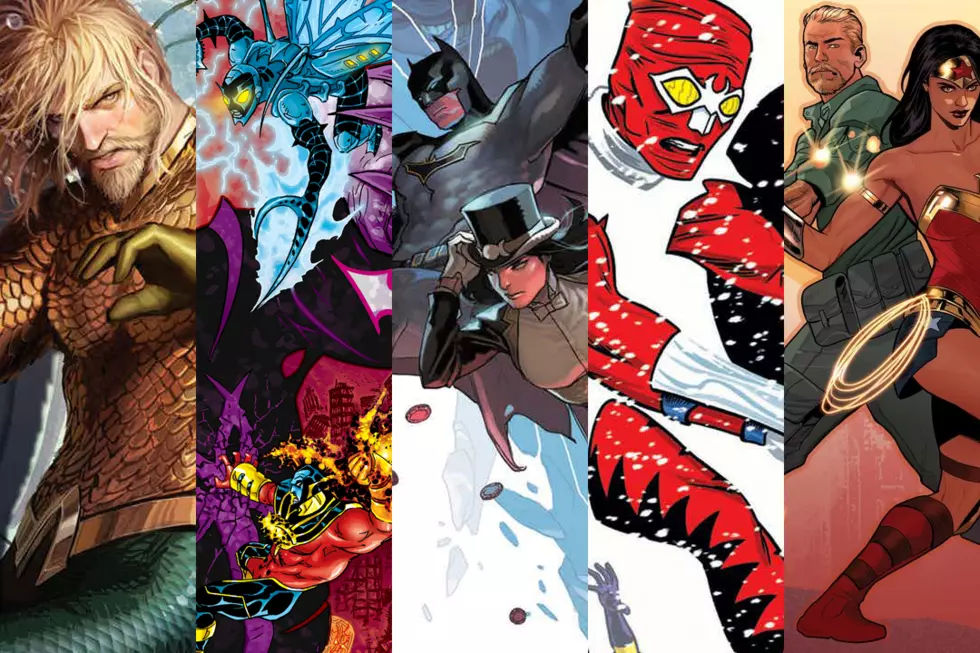

![‘Deathstroke’ Takes On The ‘Titans’ And ‘Teen Titans’ In May Crossover ‘The Lazarus Contract’ [Exclusive]](http://townsquare.media/site/622/files/2017/02/lazaruscontract-feat.jpg?w=980&q=75)
![An Epic Adventure Is Underway In ‘The Kamandi Challenge’ #1 [Preview]](http://townsquare.media/site/622/files/2016/12/KACHA_Featured.jpg?w=980&q=75)

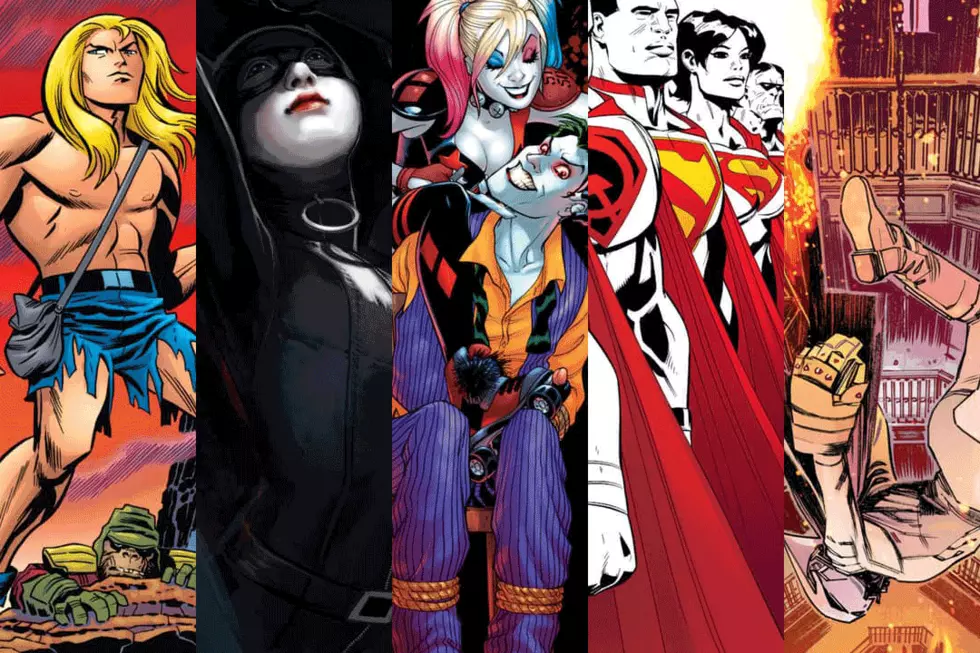
![DC Reveals Art And New Details For ‘Kamandi Challenge’ Tribute To Kirby [NYCC 2016]](http://townsquare.media/site/622/files/2016/10/Kamandi00.jpg?w=980&q=75)
![Aquaman Can Punch The Hell Out Of Superman: Dan Abnett And Brad Walker On ‘Aquaman’ [Interview]](http://townsquare.media/site/622/files/2016/09/aqm_featured2.jpg?w=980&q=75)
![Wally West And Linda Park Are Back Together At Last In ‘Titans’ #2… Sort Of [Exclusive]](http://townsquare.media/site/622/files/2016/08/TItans00.jpg?w=980&q=75)

